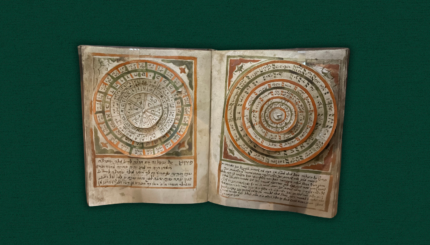As I write today’s blog entry on Tu Bishvat, I’m sitting in my home office looking at the piles of paper that I need to sort and file in order to begin getting things in order for filing my taxes this year. Its never something that I particularly look forward to, and I’m sure much procrastination will ensue before I actually succumb to the task. Yet this task that remains at hand, and today’s festival have much more in common than you might imagine.
Today, when we think of the Jewish holiday of Tu Bishvat, we think of a Jewish Arbor Day; a day to give thanks for trees, the fruit of the trees, and the beauty of our natural world. Some might think of the Kabbalists’ “Tu Bishvat Seder” ritual which utilized different kinds of fruits symbolically to take the participant on a journey into the different levels of the soul. However, relatively few will be thinking of the historical origins of Tu Bishvat, derived by the rabbis of old from a commandment in the Torah:
“When you enter the land [of Israel] and plant any tree for food, you shall regard its fruit as forbidden. Three years it shall be forbidden for you, not to be eaten” (Leviticus 19:23).
As explained on the main pages on Tu Bishvat on myjewishlearning.com, ‘when the Temple stood in Jerusalem, Tu Bishvat served as the day on which farmers offered the first fruits of the trees they planted, after the trees had turned four years old. The following Tu Bishvat signified when the farmers were allowed to begin making use of the produce of the trees they planted, whether for personal or economic reasons.’ The Rabbis of the Talmud established the 15th day (Tu) of the month of Shvat as the official “birthday” of trees from which to determine the age of the trees.
Today we no longer have a temple and relatively few of us are farmers (although there are some wonderful programs engaging a whole new generation of Jews in farming and growing food locally, such as the Adamah fellowship at the Isabella Freedman Center in the CT Berkshires, and the Kayam Fellowship at the Pearlstone Center near Baltimore, MD). Tithing is a term that is more frequently used in churches than synagogues. Perhaps the closest modern-day equivalent would be the paying of our taxes.
While tzedakah (acts of righteousness, including but not limited to monetary charity) is regarded as an obligation in Jewish tradition it is, nevertheless, a choice as to how we give, when we give, and how much. Tithing in biblical times, and paying our taxes today are obligations that fall upon us at particular times, with consequences if we fail to respond.
What is of spiritual and communal significance is that, looking back at the biblical and rabbinic sources, the farmer had an obligation to tithe from the fourth year’s produce and only then could they begin to reap the benefits for themselves. This was part of the biblical understanding that when we reap rewards, even from our own labors, we first give in recognition that we should never see ourselves as the sole agent in our success. We give thanks to the Source of Existence, and we give for the sake and for the needs of the community at large, recognizing that our place in the economic and social landscape is intrinsically linked and benefits from the broader society within which we operate. We begin by designating a portion of the year’s income as ‘not mine’. From there we figure out how to live with the rest of our portion. We might feel a little differently about paying our taxes if we tried on this framework for size, rather than seeing the government as ‘taking’ something away from us.
This Tu Bishvat I find myself considering the wisdom of this ethical framework and spiritual lesson to current conversations about U.S. tax codes, the obligations of the wealthy to pay a fair share, and the ways we talk about our obligations to ensure the well-being of all in our society. How different our communal, political, and media narratives might sound if we embraced some of these lessons today.
Tu Bishvat
Pronounced: too bish-VAHT (oo as in boot), Origin: Hebrew, literally "the 15th of Shevat," the Jewish month that usually falls in January or February, this is a holiday celebrating the "new year of the trees."



